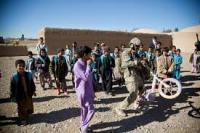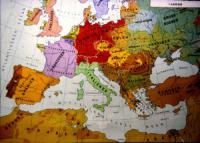-
Four ways social media platforms could stop the spread of hateful content in aftermath of terror attacks
Monitoring hateful content is always difficult and even the most advanced systems accidentally miss some. But during terrorist attacks the big platforms face particularly significant challenges. As research has shown, terrorist attacks precipitate huge spikes in online hate, overrunning platforms’ reporting systems. Lots of the people who upload and share this content also know how to deceive the platforms and get round their existing checks. So what can platforms do to take down extremist and hateful content immediately after terrorist attacks? I propose four special measures which are needed to specifically target the short term influx of hate.
-
-
49 killed in terrorist attack on mosques in New Zealand
At least forty-nine people were killed and more than twenty seriously wounded Friday in shootings at two mosques in Christchurch, New Zealand. Three men and one woman are in custody. New Zealand Prime Minister Jacinda Ardern said none of them were on security watch lists. The terrorist group’s leader, a 28-year old Australian, has been charged with murder.
-
-
New Zealand attacker’s “manifesto”: White supremacist, anti-immigration ideology
Brenton Tarrant, the 28-years on Australian mastermind behind the attacks on two mosques in New Zealand on Friday, posted a 74-page “manifesto” explaining his motivations. The manifesto expresses his far right, white supremacist, anti-immigrant ideology. He describes himself as an ethnonationalist and a fascist. The manifesto says that the attack on the mosques aims to send a message to Muslims that “nowhere in the world is safe,” and create “an atmosphere of fear” among Muslims.
-
-
Christchurch mosque shootings must end New Zealand’s innocence about right-wing terrorism
Public opinion surveys of attitudes tend to show that a majority of New Zealanders are in favor of diversity and see immigration as providing various benefits for the country. But extremist politics, including the extreme nationalist and white supremacist politics that appear to be at the core of this attack on Muslims, have been part of our community for a long time.
-
-
3,000 ISIS fighters surrender as end of caliphate nears

ISIS once controlled large parts of Syria and Iraq, but now thousands of ISIS fighters have handed themselves in. Kurdish-led units reported some IS fighters were continuing to resist.
-
-
U.K.’s Equality Commission to investigate Labour Party over failure to counter anti-Semitism
In an explosive development, Britain’s Equality and Human Rights Commission (EHRC) announced Thursday that it had begun proceedings against the Labour Party over its failure to stamp out anti-Semitism in its ranks. The equality watchdog said it has reason to believe that Labour has “unlawfully discriminated against people because of their ethnicity and religious beliefs” over the party’s handling of anti-Semitism complaints.
-
-
The guises under which current anti-Semitism travels
Today’s anti-Semitism travels under many guises. In reviewing Deborah Lipstadt’s just-published Antisemitism: Here and Now, Bret Stephens, a conservative columnist at the New York Times, writes that the most important insight of Lipstadt’s analysis is “that the resurgence of anti-Semitism owes as much to its political enablers who aren’t openly bigoted as it does to its ideological practitioners who are — is the most valuable contribution the book makes to our discussion of modern-day Jew hatred.”
-
-
ISIS child suspects arbitrarily arrested, tortured by Iraqi, Kurdish govs.

Human Rights Watch estimates that Iraqi and Kurdish authorities are holding in detention approximately 1,500 children younger than 17 years of age for alleged ISIS affiliation. Many of these children, some as young as 11 years old, have been tortured. At least 185 foreign children have been convicted on terrorism charges and sentenced to prison terms, according to Iraqi government authorities.
-
-
U.K. unveils new counter-terrorism information sharing platform

A new multi-million pound project to share information with the private sector has been unveiled by the security minister. this joint initiative will see a ground breaking interactive online platform developed to provide secure expert advice and training to businesses and public sector organizations to help them develop their own counter-terrorism approaches.
-
-
White supremacist propaganda and events soared in 2018

White supremacists dramatically stepped up their propaganda efforts targeting neighborhoods and campuses in 2018, far exceeding any previous annual distribution count for the United States and showing how these extremist groups are finding ways to share hateful messages while hiding the identity of individual members.
-
-
European ethno-nationalist and white supremacist movements thrive

More than seventy years after the defeat of Nazi Germany, ethno-nationalist and white supremacist movements in Europe continue to thrive. They include far-right political parties, neo-Nazi movements, and apolitical protest groups. Some groups openly espouse violent white supremacy, while others have propagated their radical stances under the guise of populism. Though not all of these groups directly link their ideologies to Nazism, their propaganda portrays immigrants and ethnic minorities in a similar manner to how Nazi propaganda portrayed Jews, blaming them for national economic troubles and depicting them as a serious threat to the broader national identity.
-
-
U.S. offers up to $1 million reward for information on Bin Laden son Hamza
The United States has offered a reward of up to $1 million for information leading to the “identification or location” of the son of Osama bin Laden, the deceased leader of the Al-Qaeda terror organization. “Hamza bin Laden is the son of deceased former AQ leader Osama bin Laden and is emerging as a leader in the AQ franchise,” a State Department statement said on 28 February, using an acronym for the extremist group.
-
-
Is it more dangerous to let Islamic State foreign fighters from the West return or prevent them from coming back?
The United states and other countries around the world are dealing with the same question: Should their citizens who join foreign terrorist organizations and fight for them be allowed to return to their home country? Determining which approach makes Western countries safest requires examining the facts about foreign fighters.
-
-
“We are not winning” counterterror war in Sahel, U.S. military leader in Africa says
The United States and its allies are not winning the counterterrorism war for the Sahel, the head of U.S. special operations forces in Africa said. The U.N. said last week that more than 100,000 people in Burkino Faso have been displaced by violence, and the country’s education minister has said more than 150,000 children are not going to school because of the jihadist threat.
-
-
Biolabs accidents, and genetic modification research
Exposures to infectious diseases in Bioafety level-3 (BSL-3) and BSL-4 environments can be scary, but they do happen. Concern has always extended beyond the safety of the laboratory worker, but also that a pathogen of pandemic potential could be released. Other aspects of lab safety have raised concern as well, as more attention has been directed toward gain-of-function (GoF) research.
-
More headlines
The long view
How Male Grievance Fuels Radicalization and Extremist Violence
Social extremism is evolving in reach and form. While traditional racial supremacy ideologies remain, contemporary movements are now often fueled by something more personal and emotionally resonant: male grievance.
